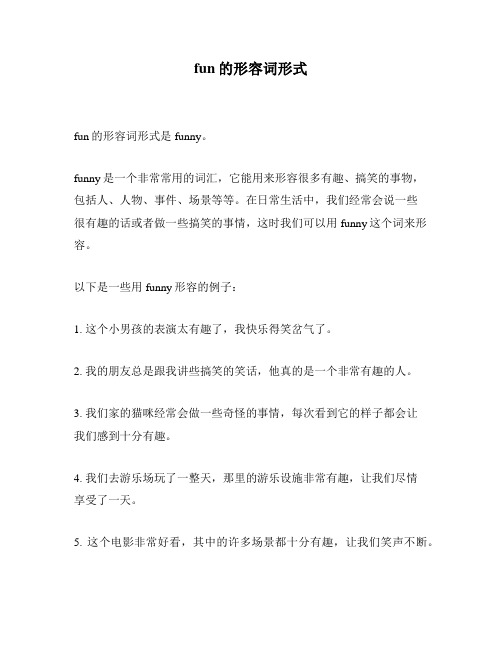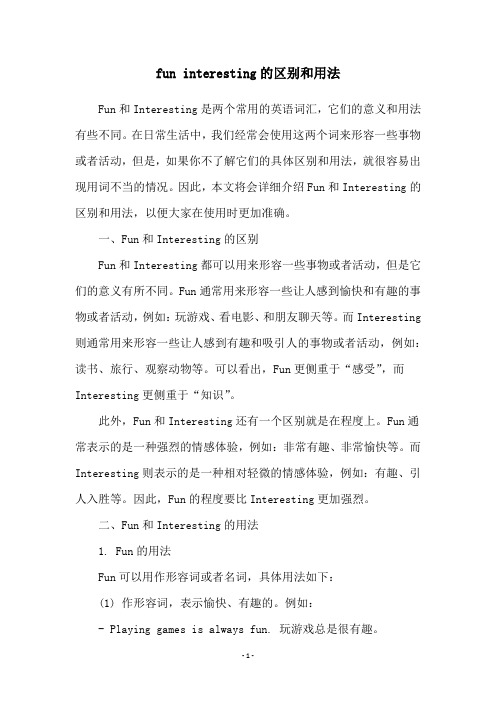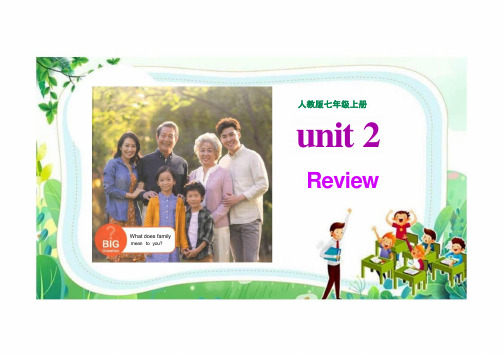fun to funny 区别
鲁教版初一英语下册第四单元知识点

Unit4 What time do you go to school?学习目标1.重点单词、词组用法讲解,学以致用。
2.句型、语法分析,掌握时间表达及一般现在时的用法。
3.用when和what time 引导的特殊疑问句询问时间和时间的表达法;用所学的教育目标语言对生活和学习活动做计划,学会合理的安排作息时间。
导入新课一、词汇复习----见课本词汇表(一)默写下列单词1. 向上2. 刷,刷净3. 牙齿4. 沐浴5. 通常地6.四十7.从不,绝不8.早的9.五十10.工作11.电视台12. 夜晚13. 奇怪的14. 锻炼15.最好的16. 组,群17.晚于18. 一刻钟19.家庭作业20.打扫;干净的21.很快地22.或者,也23.有时,间或24. 生命,生活25.穿衣服26.穿上衣服27.......点钟,整点28.在周末29.晚于30.跑,奔31.行走,步行32.品尝,味道33.要么........,要么........(二)重点短语1. 起床____ _____2. 去上学___ _______3. 穿衣服_______4. 刷牙__ ______5. 吃早餐_________6. 洗澡_ _____7. 大量8. 散步__ ____9. 因…….迟到10.需要做某事11. 广播台____ _____ 12.有时间做某事___ _______13. 做家庭作业_______ 14. 从…..到……__ ______15.吃晚饭_________ 16.打扫我的房间_ _____1 7.保持好牙齿 1 8. 在周末__ ____新知探究生成一、重难点解析1.What time do you usually take a shower, Rick?【点拨】What time + do/does +主语+动词原形?句型,回答要用具体时间。
Eg: ----What time do you get up? ----I get up at six o’clock.【拓展】What time 还可用来询问此刻的时间。
鲁教版初一下学期英语u5

Unit 2 What time do you go to school ?一、主要词组:get up:起床either…or…或者…或者…;要么…要么…get dressed:穿上衣服lots of:大量take a shower:洗澡go to bed:上床睡觉radio station:广播台do homework:做家庭作业go to school:去上学eat dinner:吃晚饭bursh teeth:刷牙齿take a walk:散步be late for:因……迟到clean my room:打扫我的房间need to do sth:需要做某事have good teeth:保持好牙齿have time to do sth:有时间做某事from…to…:从…到…on weekends:在周末=on the weekend take a walk:散步二、主要句式:What time do you usually get up?I usually get up at six thirty.What time does Rick eat breakfast?He eats breakfast at seven o’clock.When does Scott go to work?He always goes to work at eleven o’clock. He is never late.That’s a funny time for breakf ast.三、语言点:1.get相关词组辨析:get up 起床;get on 上(车、船等);get off:下(车、船等);give up:放弃2.interested与interesting单词含义用法Interested 感兴趣;对…感兴趣通常修饰“人”,通常用于be/get/feel/become interested in结构中Interesting 令人感兴趣的;有趣的通常修饰“物”3.o’clock的用法:指“…点钟”,用在整点之后。
fun的形容词形式

fun的形容词形式
fun的形容词形式是funny。
funny是一个非常常用的词汇,它能用来形容很多有趣、搞笑的事物,
包括人、人物、事件、场景等等。
在日常生活中,我们经常会说一些
很有趣的话或者做一些搞笑的事情,这时我们可以用funny这个词来形容。
以下是一些用funny形容的例子:
1. 这个小男孩的表演太有趣了,我快乐得笑岔气了。
2. 我的朋友总是跟我讲些搞笑的笑话,他真的是一个非常有趣的人。
3. 我们家的猫咪经常会做一些奇怪的事情,每次看到它的样子都会让
我们感到十分有趣。
4. 我们去游乐场玩了一整天,那里的游乐设施非常有趣,让我们尽情
享受了一天。
5. 这个电影非常好看,其中的许多场景都十分有趣,让我们笑声不断。
总之,funny这个词用来形容不同的事物都可以表达出一种搞笑、有趣
的感觉。
生活中有趣的事情随处可见,希望大家都能发现身边的乐趣,过一个愉快有趣的生活。
fun interesting的区别和用法

fun interesting的区别和用法Fun和Interesting是两个常用的英语词汇,它们的意义和用法有些不同。
在日常生活中,我们经常会使用这两个词来形容一些事物或者活动,但是,如果你不了解它们的具体区别和用法,就很容易出现用词不当的情况。
因此,本文将会详细介绍Fun和Interesting的区别和用法,以便大家在使用时更加准确。
一、Fun和Interesting的区别Fun和Interesting都可以用来形容一些事物或者活动,但是它们的意义有所不同。
Fun通常用来形容一些让人感到愉快和有趣的事物或者活动,例如:玩游戏、看电影、和朋友聊天等。
而Interesting 则通常用来形容一些让人感到有趣和吸引人的事物或者活动,例如:读书、旅行、观察动物等。
可以看出,Fun更侧重于“感受”,而Interesting更侧重于“知识”。
此外,Fun和Interesting还有一个区别就是在程度上。
Fun通常表示的是一种强烈的情感体验,例如:非常有趣、非常愉快等。
而Interesting则表示的是一种相对轻微的情感体验,例如:有趣、引人入胜等。
因此,Fun的程度要比Interesting更加强烈。
二、Fun和Interesting的用法1. Fun的用法Fun可以用作形容词或者名词,具体用法如下:(1) 作形容词,表示愉快、有趣的。
例如:- Playing games is always fun. 玩游戏总是很有趣。
- We had a lot of fun at the party. 我们在聚会上玩得很开心。
(2) 作名词,表示娱乐、嬉戏的活动。
例如:- We had a fun afternoon at the amusement park. 我们在游乐园度过了一个愉快的下午。
- Let's have some fun together. 我们一起来玩吧。
2. Interesting的用法Interesting通常用作形容词,表示有趣、引人入胜的。
funny词根词缀

funny词根词缀
词根是“fun”,意为“乐趣、娱乐”。
词缀包括:
- “-y”,表示“具有……性质的、充满……的”,如“funny”(有趣的)、“funnily”(滑稽地);
- “-ness”,表示“状态、性质”,如“funness”(乐趣);
- “-ish”,表示“有点儿……的、似……的”,如“funish”(有点儿有趣的);
- “-like”,表示“像……的、类似……的”,如“funlike”(有趣的、像娱乐的);
- “-ful”,表示“充满……的、有……性质的”,如“funful”(充满乐趣的);
- “-less”,表示“没有……的、缺乏……的”,如“funless”(无趣的、缺乏乐趣的)。
这些词缀可以与“fun”词根结合,形成不同的词汇,表达与“乐趣”、“娱乐”相关的含义。
需要注意的是,这些词汇并不一定都被广泛使用或接受,有些可能是虚构的或不常见的用法。
在正式的英语使用中,常见的词汇如“funny”、“fun”等更为常见和规范。
2024-2025学年人教版(2024)七年级英语上册+Unit+2+单元复习课件

9.have fun的用法
have fun
—I'm going to Peter's birthday party. 我要去参加彼得的生日派对。 —Have fun /have a good time / enjoy yourself.玩得开心。
玩得开心;过得愉快,与have a goodtime, enjoy oneself同 义
她能把它(指钢琴)演奏得很好! 4.They have some nice ping-pong bats.
他们有一些漂亮的乒乓球拍。
5.—Do you play the piano? 你弹钢琴吗?
—Yes,I do./No,I don’t.
是的,我弹钢琴。/不,我不弹钢琴。
6.—Does your mother have a piano? 你妈妈有一架钢琴吗?
What does family mean to you?
人教版七年级上册
unit 2
Review
amMa
S
mean
husband bat ping-pong bat play ping-pong every day together fishing rod spend
/mi:n/
V.
/'hʌzbənd/ n.
/bæt/
n.
/tə'geðə(r)/ adv. /spend / V.
意思是;打算 丈夫 球棒;球拍 乒乓球拍 打乒乓球 每天 一起;共同 钓竿 花(时间,钱等 )
really
activity chess Chinese chess funny laugh different violin
/'rixəli/ adv.
fun的用法和搭配
fun的用法和搭配1. “Fun”可以直接作名词用呢,就像“Have fun!”(玩得开心呀!),比如我们出去逛街,朋友就会说“Let's go and have some fun.”(我们走吧去找点乐子。
)。
2. “Fun”也能和形容词连用,变成像“a lot of fun”(很多乐趣)这样的表达。
嘿,上次我们去那个游乐园,那可真是“a lot of fun”,大家都玩得超嗨皮!(可不是嘛!)3. “Fun”还能构成一些常用短语,像“have fun doing sth”(做某事有乐趣)。
你想想,我们一起打球的时候,不就是“have fun playing basketball”嘛!(对呀对呀!)4. “It's fun to do sth”也是很常见的哟,“It's fun to watch movies on weekends.”(周末看电影超好玩诶。
),你肯定也有同感吧?(那必须的!)5. “Fun”有时候还可以作形容词呢,像“funny”一样,比如“This game is fun.”(这个游戏很有趣。
),咱上次玩的那个游戏不就这样嘛!(哈哈,没错!)6. “Make fun of”可是个不太好的用法哦,可别随便“make fun of”别人呀。
(就是呀,那样可不太好。
)7. “For fun”表示为了好玩,“I play the guitar for fun.”(我弹吉他就是为了好玩。
)是不是很有感觉?(挺有意思的哈。
)8. “In fun”也很有意思呢,表示开玩笑地,上次我跟他开玩笑说“你这个大笨蛋”就是“In fun”啦。
(哈哈,还好他没生气。
)9. “Fun”和其他词搭配起来那玩法可多啦,就像生活充满了各种乐趣一样!我们要多多发现“fun”呀!(没错,要尽情享受生活中的乐趣!)我的观点结论:“Fun”的用法真的很多,我们在生活中要好好运用,让日子变得更加有趣!。
人教版-五年级上 英语Unit8知识点梳理
五上Unit 8 At Christmas一、词组二、句子1. We always have a lot of fun at Christmas.在圣诞节我们总是玩得很开心。
2.First, we buy presents for our family and friends.首先,我们为我们的家人和朋友们买礼物。
3.We sometimes go to see Father Christmas.有时,我们去看圣诞老人。
4.Next, we put some pretty things on the Christmas tree.接着,我们把一些漂亮的东西放在圣诞树上。
5. It looks great!看上去真不错!6. Then, Christmas Eve comes.然后,圣诞夜来了。
7. Children put a stocking on their beds and wait for presents.孩子们把一只长筒袜放在床上并等待礼物。
8. We wake up early and open our presents.我们早早醒来并打开我们的礼物。
9. We eat a turkey and Christmas pudding.我们吃一只火鸡和圣诞布丁。
10. We all have a good time!我们都玩得开心!11. People always have a big lunch on Christmas Day.在圣诞节人们总是吃一顿丰盛的午餐。
12. Here’s a Christmas card for you.给你一张圣诞卡片。
13.You’ll get juice on my jacket.你会把果汁弄到我的夹克衫上。
14. What do you do at Christmas? = What do you do on Christmas Day?在圣诞节你做什么?15. I usually do my homework at five o’clock in the afternoon.我通常在下午五点钟做作业。
牛津深圳版八年级上英语Unit4课文+语法练习题(无答案)
牛津深圳版八年级上英语Unit 4 课文+语法练习题(无答案)Unit 4 Inventions课文重点Great inventionsGreat inventions change the world. They help people live a better life. The following are three of the most important inventions in history.The wheelThe wheel is perhaps the greatest invention in history. After its invention, travelling became faster and more comfortable. A few thousand years ago, people started to use wheels on carriages. In the early 19th century, thefirst trains began to carry passengers. At the start of the 20th century, cars became popular. Without the wheel, we would not have these inventions.The telephoneAlexander Graham Bell invented one of the first practical telephones in 1876. Since then, people have been able to speak to each other over long distances. Today millions of people across the world own mobile phones. They allow people to keep in touch with each other anytime, anywhere.The light bulbThomas Edison developed the first practical light bulb in 1879. Before the invention of the light bulb, people hadto use oil lamps, gas lamps or candles to see at night. With light bulbs, people can do as many things in the evening as they can in the daytime. Can you imagine living without them?Key sentences1. Listen to advertisements for four funny inventions. 听四则有趣发明的广告.(1).advertisement n.广告(可数) ad 缩写advertise v.做广告,登广告They will put an advertisement in the newspaper.(2) .funny adj.可笑的;滑稽的You' re an extremely funny man. 你是一个非常滑稽的人。
人教版七年级英语下册unit2知识点
Unit2Whattimedoyougotoschool?短语·集萃1.getup起床2.either…or…或者…或者…;要么…要么…3.getdressed穿上衣服4.lotsof大量5.takeashower洗澡6.gotobed上床睡觉7.radiostation广播台8.dohomework做家庭作业9.gotoschool去上学10.eatdinner吃晚饭11.burshteeth刷牙齿12.takeawalk散步13.belatefor因……迟到14.cleanmyroom打扫我的房间15.needtodosth需要做某事16.havetimetodosth有时间做某事17.from…to…从…到…18.onweekends在周末=ontheweekend句式·记忆4.1.getinterested3.o’clock4.fun与①funny②funIt’5.4:30p.m.8:14读作6.halfa(7.quarter①gotobed强调“上床睡觉”的动作及过程,无“睡着”的意思。
②gotosleep强调“入睡;睡着”这一动作,强调人已经“睡着”。
9.quickly,fast和soon的区别:①quickly迅速的强调动作发生或完成得快,也可指人的思维敏捷。
②fast迅速的强调运动速度之快,既可做形容词,也可作副词。
可与quickly互换。
③soon不久以后侧重两件事情的先后发生,中间的间隔的时间很短。
Eg:1)Thenextmorning,theteacheraskedtheboy,“Howdidyoufindtheanswersoquickly?”第二天早上,老师问这个男孩:“你怎么能够这样快找到了答案的呢?”2)YouarealwayssayingIamgrowingsofast.你老是说,我长得很快。
3)Soontheywereinthemiddleoftheriver.很快他们就到了河中间。
- 1、下载文档前请自行甄别文档内容的完整性,平台不提供额外的编辑、内容补充、找答案等附加服务。
- 2、"仅部分预览"的文档,不可在线预览部分如存在完整性等问题,可反馈申请退款(可完整预览的文档不适用该条件!)。
- 3、如文档侵犯您的权益,请联系客服反馈,我们会尽快为您处理(人工客服工作时间:9:00-18:30)。
The mall is a really fun place to go.
名词也是可以作定语的,这里就是。
形容词作定语往往表示人为的判断,而名词作定语表示被修饰的词的功能与用途、范围等。
一、首先是明白funny 与 fun 词性不同:
fun n. 娱乐, 玩笑, 嬉笑, 有趣的人或事物 vi. 开玩笑 adj. 供娱乐用的
funny adj. 有趣的, 好笑的, 滑稽的, 奇异的, 古怪的(带有贬义) n. 滑稽人物-
这两个词有程度上的不同,要看你要表达什么样的意思,说 a funny party 或 a fun story 也是可以的。
It's funny. 很滑稽的,很有趣的。
It's fun. 很好玩。
(从娱乐方面来说) funny 还有一些贬义的意思:
1 奇特的;难以了解的 a funny temper 奇特的性格
2 失常的;不诚实的 There's sth funny about the telephone;it won't work. 电话有点反常,打不通。
3 有病的;不舒服的 She felt a bit funny. 她觉得有点不舒服。
二、两者含义上也有差别:funny 表示“有趣的,滑稽的”,它指的是一种滑稽可笑的“有趣”,侧重点是让人觉得好玩或发笑。
而 fun 则主要指“有趣,好玩”,不像funny 那样强调“滑稽”。
例句: It is more fun to go with someone than to go alone. 偕伴同去比自己独自去好玩。
It's funny to see a man walk with his hands and head. 看见一个人倒立走路很滑稽
n. 乐趣,玩笑,娱乐 n.[U] Enjoyment, pleasure, or amusement.
vi. 开玩笑 vi. To joke.
a. 供娱乐用的 a. Interested.
Eg:I wasn't serious; I only did it for fun. 我不是当真的,我只不过是闹着玩。
Playing basketball is great fun. 打篮球很有趣。
I dont see the fun of doing that. 我并不觉得那样做有甚么好玩的。
He was just funning. 他是在开玩笑。
It is fun picking up various shells on the beach. 在海滨捡各种贝壳是很有趣的。
What fun! 好有趣,真愉快。
He is good [great] fun. 他真有趣((他是个有趣的人))
Don't take offense. I said it in fun. 别生气,我只是说着玩的。
Phrases: a fun party 快乐的宴会
have fun 作乐,玩乐
make fun of=poke fun at 嘲弄…,取笑
make fun of 取笑
in/for fun 闹着玩儿地;开玩笑的
fun and games 嬉闹
变化: funner; funnest
同义词:pleasure, enjoyment, playfulness, amusement, transport, sport,
entertainment
反义词:boredom, respect, boring
funny
a. 好笑的,有趣的,滑稽的 a. Causing laughter or amusement.
n. 滑稽人物 n.[C] Comic strips.
Eg: A funny thing happened. 发生了一件好笑的事。
This is a very funny book. 这是一本很逗笑的书。
That's the funniest joke I've ever heard. 这是我听过的最可笑(或滑稽)的笑话。
I told my little sister a funny story. 我给我的小妹妹讲了一个有趣的故事。
What a funny bird! 一只多么奇怪的鸟!
His behaviour was rather funny. 他的举止颇为古怪。
He has a funny temper. 他的脾气很怪。
There is something funny about the matter. 事情有点希奇。
Phrases: feel a little funny 有点不舒服
a funny man 引人发笑的人; 喜剧演员
a funny column [paper] 报纸的漫画栏
a funny book 漫画书
a funny story 滑稽的故事
变化: funnier; funniest
同义词:hilarious, ludicrous, humorous, droll, amusing, comic, witty,
entertaining, comical, laughable, odd
反义词:conforming, serious。
